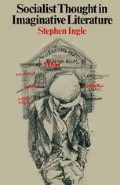Abstract
William Morris, we have seen, believed men to be ‘artists’ by nature, by which he meant that their basic instincts were creative and not, for example, political, in the Aristotelean sense. The most fulfilling thing a man could do was to create, and the job of society was simply to maximise his opportunity to do so. Morris himself, it will be remembered, resorted to politics chiefly because he believed that bourgeois society was structured in such a way as to restrain man’s creative instincts and thus prevent him from becoming a complete man. Indeed, Morris was persuaded to become a socialist precisely because the men he saw about him were stunted and incomplete and in no way compared to his vision of the full man. ‘In the times when art was abundant and healthy’, he wrote, ‘all men were more or less artists; that is to say, the instinct for beauty which is inborn in every complete man had such force that the whole body of craftsmen habitually and without conscious effort made beautiful things … and the audience was nothing short of the whole people.’1 It is important to attach a precise meaning to the word art, but before we attempt this task we should note the words in italics.
Access this chapter
Tax calculation will be finalised at checkout
Purchases are for personal use only
Preview
Unable to display preview. Download preview PDF.
Notes
See S. J. Ingle, ‘Socialist Man: William Morris and Bernard Shaw’, in The Concept of Socialism, ed. B. Parekh (London: Croom, Helm, 1975) pp. 72–94.
Aldous Huxley, Brave New World (Penguin edition, 1973) p. 24.
G. D. H. Cole, in William Morris as a Socialist (London: William Morris Society, 1960) wrote: ‘I became a socialist more than fifty years ago when I read News From Nowhere as a schoolboy and realised quite suddenly that William Morris had shown me the vision of a society in which it could be a fine and fortunate experience to live’ (p. 1).
Copyright information
© 1979 Stephen J. Ingle
About this chapter
Cite this chapter
Ingle, S. (1979). ‘No Masters and no Masters’ Men’. In: Socialist Thought in Imaginative Literature. Palgrave Macmillan, London. https://doi.org/10.1007/978-1-349-04108-4_7
Download citation
DOI: https://doi.org/10.1007/978-1-349-04108-4_7
Publisher Name: Palgrave Macmillan, London
Print ISBN: 978-1-349-04110-7
Online ISBN: 978-1-349-04108-4
eBook Packages: Palgrave Literature & Performing Arts CollectionLiterature, Cultural and Media Studies (R0)

